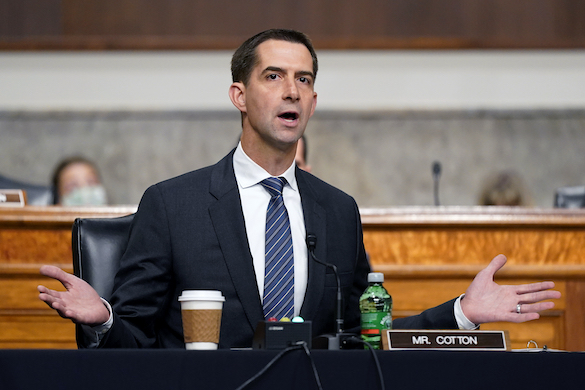Trump’s First Big Second-Term Foreign Policy Decision Is Between Senators Vance and Cotton
The two potential running mates offer diametrically opposed views on America’s role in the world.

President Trump’s possible selection of either Senator Cotton of Arkansas or Senator Vance of Ohio as a running mate gives the Republican Party a chance to pick not just a vice presidential candidate, but a foreign policy direction.
Mr. Cotton and Mr. Vance have some elements in common. Both served in the military: Mr. Vance in the Marines between 2003 and 2007, Mr. Cotton in the Army between 2005 and 2009 with subsequent service in the reserves.
Both have Ivy League degrees: Mr. Vance from Yale Law School, and Mr. Cotton with both a bachelor’s and a law degree from Harvard. Mr. Vance, 39, is younger than Cotton, 47.
Yet on national security policy, the two men are opposites, with Mr. Cotton favoring a more Reagan-style forward strategy for freedom and Mr. Vance tilting toward a more isolationist, fortress-America approach.
Exemplifying the divide: in the April 2024 Senate vote on final passage of $95 billion in aid to Israel, Ukraine, and Taiwan, Mr. Cotton voted in favor of the aid, along with the Republican leader, Senator McConnell, and other old-guard, mainstream internationalist Republicans such as Senators Romney and Graham. Mr. Vance joined the peacenik Vermont socialist, Senator Sanders, in voting “no.”

Another concrete example of the split between the two is over the Quincy Institute, a think tank and advocacy group focused on foreign policy issues.
Mr. Cotton has been a fierce critic of the Quincy Institute. On May 15, he posted on X that the institute “isn’t just a hotbed of pro-Iran lobbying and antisemitism, now it’s shilling for Chinese communists in Congress. But not really surprising from the Blame America First crowd.”
In February 2023, Mr. Cotton posted, “Of course the Quincy Institute would reflexively take the Chinese Communist Party’s side. No American lawmaker should take the Quincy Institute seriously.”
In January 2020, Cotton said antisemitism was festering “in Washington think tanks like the Quincy Institute, an isolationist blame America first money pit for so-called ‘scholars’ who’ve written that American foreign policy could be fixed if only it were rid of the malign influence of Jewish money.”
Mr. Vance, by contrast, delivered the May 23, 2024, keynote address at a Quincy Institute conference, “A Foreign Policy for the Middle Class: Realism and Restraint Amid Global Conflict.”
“Ukraine is hardly a perfect democracy,” Mr. Vance said to that audience, denouncing what he called “the foreign policy conventional wisdom.”
“I am supportive of Israel in their war against Hamas,” Mr. Vance said to that group. “I certainly admire the Ukrainians who are fighting against Russia, but I do not think it is in America’s interest to continue to fund an effectively never-ending war in Ukraine.”
Mr. Vance said spreading democracy around the world is not in America’s interest. “That’s preposterous,” he said. Later, he called it “crazy.”
“Traditional neoconservative foreign policy keeps on leading to the genocide of Christians,” he said.
“The Israelis are doing the most important work to actually give us missile defense parity. That’s a very important objective,” he said.
Regarding the war in Ukraine, Mr. Vance said the Europeans aren’t carrying their fair share of the burden.
Mr. Vance caricatured and denounced neoconservatism: “I think the neoconservative approach to China is sort of the dumbest of all possible solutions: they want the Chinese to manufacture all of our stuff and they also want to go to war with China.”
Mr. Vance helped to organize a June 6 fundraiser for Mr. Trump in San Francisco with Silicon Valley investor David Sacks, a loud critic of neoconservatism, Axios reported. Mr. Sacks, who is close to Elon Musk, recently posted “this is grotesque” above a picture of Nikki Haley writing notes on shells that the Israel Defense Forces were about to use on Hamas targets in Gaza.
Mr. Trump might decide to go with a choice other than Vance or Cotton. Even if he does, however, the fault lines over foreign policy are likely to continue into the Trump campaign and, if Mr. Trump is elected, his administration, affecting everything from personnel choices on a defense secretary, secretary of state, and national security adviser to policy decisions about the Middle East, Eastern Europe, and East Asia.
In his first term, Mr. Trump himself often tended to split the difference between the two tendencies, threatening and making plans to pull back or reassign American troops stationed abroad, but sometimes delaying or reconsidering implementation of the decisions in response to complaints.

